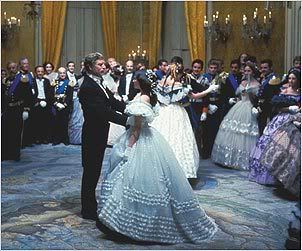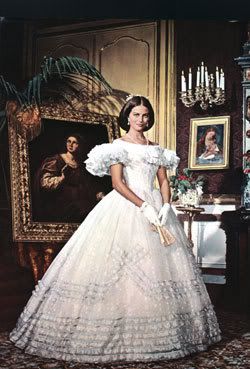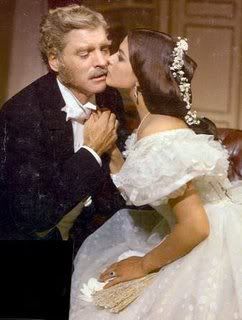Sunday, February 17, 2008
The Leopard on film
A few postings ago I wrote about Giuseppe di Lampedusa's brilliant novel, The Leopard. I remarked in passing on the 1963 film version, which I damned with faint praise ("a big-budget movie, diverting in its way but superficial compared to its source").
More recently I saw the movie in its latest incarnation, one of the Criterion Collection's typically superb DVD transfers. Criterion did their usual high-tech processing of the best available archival sources (sorry, I didn't watch the "extra" about the restoration of the film, so I don't know the details). They worked with the original cinematographer to recreate his intended colors and tones, and the result is far more striking and atmospheric than the previous DVD version I saw. It's in the original aspect ratio, of course, about 2.20: 1, with subtitles which I presume you can switch off if you can follow the dialogue without them.
So am I now completely won over, and here to recant my previous words? Not entirely. The Leopard (film) is superficial compared to its source. Lampedusa's novel is a remarkable fusion of external events and inner experience, primarily that of Don Fabrizio, Prince of Salina, around the time when Garibaldi's army was fighting in Sicily and Italy. By their nature, films tend to emphasize events; relatively few convey psychology in any depth. I have to give the director, Luchino Visconti, a tip of the hat: he tries to do the impossible, find the cinematic equivalent of the soul of the novel, and almost pulls it off. Almost.
Visconti (Rocco and His Brothers, The Damned, Death in Venice) was a hit-or-miss director with an excellent feeling for atmosphere and laudable ambition. All his films I've seen are memorable in parts, but I know of none that quite hang together into something greater than their bits -- except, possibly, this one.
The Leopard may be his best. He and his designers took exquisite care with the sets (the interiors filmed in real palazzi in Sicily), the costumes, the characters' manners. Unlike so many period movies today, there is no effort to give the dialogue (a lot of which is directly from the book) a contemporary "edge." Anyone who is fascinated by how people lived in other times and places will enjoy this window on Sicily, circa 1860.
The biggest surprise for me, on seeing Burt Lancaster again as Don Fabrizio, is that he is ... I have to say it ... good in the role. He has never impressed me in anything else, but he must have had talent that no Hollywood director ever asked him for. He conveys the aristocrat's pride and gravity, and even gives you shadings and details that are worth watching. About the only things missing from the performance are the Prince's yearning for the eternal, which he can vaguely sense only through his telescope, his world weariness, and his consciousness of the lengthening shadow of mortality. But only an absolutely top-class actor could have conveyed those qualities between the lines (if only Olivier could have been cast! But even if he'd wanted the part, he was busy running the National Theatre at the time).
Lancaster appears to have spoken his lines in Italian. The voice was post-synchronized by (I assume) an Italian actor, but still, to make it look even fairly realistic (which it does), he couldn't just read the lines in English. Bravo, Mr. Lancaster. (Oddly, all the dialogue, even by Italian actors, seems to have been looped. Was the on-set sound recording that bad?)
Unfortunately, the rest of the cast is at best serviceable, at worst mediocre. Don Fabrizio's nephew Tancredi is played by Alain Delon, of whom Dwight Macdonald once said (about another role) that he was "a decorative hole in the middle of the picture." He's dull here. Claudia Cardinale is certainly attractive enough, but doesn't leave much of an impression. The only other performer previously known to me, Serge Reggiani, is more famous now as a singer in France; his career change from actor to vocalist was a smart move.
The movie makes disappointingly little of one of the novel's most "cinematic" passages, where Tancredi and Angelina explore long-forgotten rooms in the huge old palace at Donnafugata. There is also an interminable battle scene in the streets of Palermo. Visconti seems to have had no skill as an action director.
But while there are dead spots, and some of the cuts made when the film was originally released (the American version was especially shortened) might have been justified, The Leopard is a genuine work of art. Few films integrate characters and their social and cultural background as vividly as this, and more often than not, Lancaster gives a convincing portrait of an unusual man, proud, cynical, uncomfortable as paterfamilias, but also subtle and humane.
Subscribe to:
Post Comments (Atom)








2 comments:
Oddly, all the dialogue, even by Italian actors, seems to have been looped. Was the on-set sound recording that bad?
Looping 100% of the dialogue seems to have been the standard practice in Italian cinema all the way to the 70's or even 80's. It takes some time to get used to that. I still find it a bit disturbing and disorientating sometimes, especially when I'm watching something as visually immaculate as Fellini's late films.
I think they looped everything because they simultaneously made international versions for different languages, in French and English etc.
Lost in Finland,
That's interesting. But why would they loop the dialogue of Italians speaking Italian in the original-language version?
Post a Comment